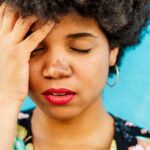Last Wednesday, Call Her Daddy host Alex Cooper dropped a solo episode where she shared that she decided to come off birth control to start trying for a baby. There was just one problem: Shortly after she stopped taking the pill, Cooper experienced intense side effects—so much so that she put her family planning on pause.
At first, she felt normal and experienced spotting, she told fans during the episode. About a month later, though, Cooper said she experienced acne, high emotions, and extreme vertigo and dizziness to the point that she would pass out. “I could feel my body trying to re-regulate,” she said. After about four months, her period returned and brought “excruciating” cramps with it. Cooper says it took a lot before she was able to get back to normal after feeling “awful 24/7.”
It’s not something anyone wants to go through. And, if you’re on the pill, you might be worried about what would happen if you decided to stop taking it. While Cooper said on her podcast that everyone has a different experience and that she wasn’t advocating anyone stop the pill, you might be left with more questions than answers. Ahead, some answers.
Meet the expert: Jaime Knopman, MD, is a reproductive endocrinologist, director of fertility preservation for CCRM Fertility of New York, and author of the upcoming book Own Your Fertility.
Why do people experience side effects after stopping the pill?
There’s actually a very simple explanation behind why people start to feel worse after stopping birth control pills. Symptoms that occur when coming off the pill aren’t caused by the pill itself; it’s the opposite, says Jaime Knopman, MD, a reproductive endocrinologist and director of fertility preservation at CCRM Fertility of New York. By not taking the pill anymore, your body begins to experience hormonal fluctuations that have been kept at bay for a long time—and all the symptoms that come with them.
“The ovaries are put to sleep by the pill, but in doing that, normal fluctuations that occur with the rise and fall of hormones like estrogen and progesterone are turned off,” says Dr. Knopman. “It’s sort of like your body is in this steady state.” When you’re no longer in that steady state though, you might experience symptoms like acne, mood swings, and more. (One symptom that is uncommon? Vertigo, which Cooper unfortunately experienced. Dr. Knopman says could be caused by fluid shifts in the inner ear.)
So, it’s not that the pill is causing any problems, but more so that it’s masking—and in many cases—treating them. For example, plenty of women take birth control to treat their hormonal acne, premenstrual dysphoric disorder, or endometriosis. When you stop taking it, any of those symptoms you’d be experiencing without the help of the pill return.
It’s not ideal, but it’s normal to get back some of those classic period symptoms after stopping the pill, and that’s just down to how hormones work, says Dr. Knopman. “Know that you may have a few months where you’re like, ‘There are some days I feel amazing and some days I feel terrible,’” she says. But, for the most part, they shouldn’t impact your daily activities. (If they are, like in Cooper’s case, it’s a good idea to see your doctor.)
If you’re wondering what it might be like if you stopped the pill, try to remember what your period was like before, which might be a challenge if you’ve had those symptoms masked for years. Two things to keep in mind: it’s safe to be on this med long-term, so if you don’t want to stop taking it, you don’t have to and taking the pill won’t exacerbate any symptoms when you come off of it, Dr. Knopman. Still, it’s possible your period symptoms will be different just because hormones may shift as you get older.
What should you expect when you stop the pill?
To a certain extent, some side effects are normal when stopping the pill. It’s possible to get more acne (as a result in changing testosterone levels), experience bloating (due to increased progesterone), or have emotional changes. “We feel great on estrogen and sort of crappy on progesterone,” Dr. Knopman explains.
It also may take some time for your period to return. About 90 percent of women get their period back within six months of stopping the pill, says Dr. Knopman, but for some, it may take even longer. As for what’s behind the delay: when you’re on the pill, FSH and LH, both of which are produced in the brain, are suppressed and it takes a second for the brain to start producing them again. It’s kind of like when you wake up groggy after taking a sleeping pill, Dr. Knopman says.
Though it could take up to six months for your period to return, if you stopped the pill with the hopes of getting pregnant, it’s not a bad idea to see a doctor after three to four months, says Dr. Knopman. This way they can check and make sure there isn’t something else going on. Just like the pill might keep you from feeling period symptoms, it can also obscure issues with fertility. “The pill does not cause infertility—I will say that until I’m blue in the face—but if you have infertility, it may mask it,” Dr. Knopman says.
Olivia Luppino is an editorial assistant at Women’s Health. She spends most of her time interviewing expert sources about the latest fitness trends, nutrition tips, and practical advice for living a healthier life. Olivia previously wrote for New York Magazine’s The Cut, PS (formerly POPSUGAR), and Salon, where she also did on-camera interviews with celebrity guests. She’s currently training for the New York City marathon.
Read the full article here




